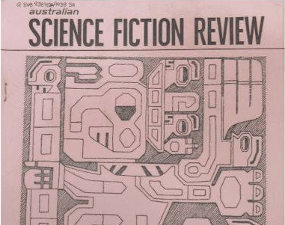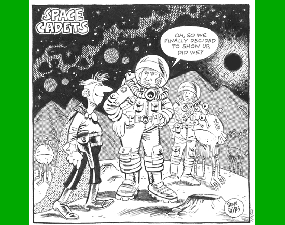 Loncon3, the 72nd Worldcon, starts in earnest today.
Loncon3, the 72nd Worldcon, starts in earnest today.
It would be the 75th Worldcon but for a four year interruption for a pesky little international feud called World War II. (During which fans arranged for fanzines and prozines to be shipped across the big pond; Worldcons might have been suspended, but fanac soldiered on.)
Among the many traditional special exhibits, panels, awards and parties, another fannish tradition will be on display at Loncon3. Fannish ideals. They’ll be expressed both subtly and overtly through various programs (accessibility, anti-harassment policy, panels such as Diversity in Speculative Fiction) and through the interpersonal play of the individuals attending.
It may be difficult to accept, but these ideals were articulated (on the record) as far back as 1935 when the first SF clubs were being formed by teenagers with names like Pohl, Asimov, Wollheim, Palmer, Kidd, Moskowitz, Kornbluth, Knight, Weisinger, Merrill, Kyle, Schwartz, Ackerman.
It is certainly true that over the past eight decades those ideals frequently received little more than lip service. It is also true that our understanding of them differs somewhat (if not more than somewhat) from those who first put them on the table. “Women’s lib” in 1935 (at least in so far as men were concerned) meant you might not be looked down upon as much if your wife had a job (as secretary or waitress) – but she was still going to be making the sandwiches, doing the laundry and her pretty little head wasn’t capable of handling higher math or politics (and was cause for notice – along with scorn and derision – when they proved that they could.) LGBTQ would mean absolutely nothing to no one and tolerance of that lifestyle meant ignoring it. Services for the disabled meant a “nice home” of the sanitarium variety if your family could afford it, or pushing yourself around on a handtruck while selling pencils if they couldn’t.
Of course those fall far short of our expectations these days, and individuals will have to decide for themselves whether those who tried to be enlightened back then should be praised for their efforts or castigated for their failures, but that’s the thing about IDEALS. No one ever achieves them in anything like their pristine, idealogical form.
Just one example to illustrate the contextual nature of ideals: I wonder how pet owners – responsible, enlightened, treat-pets-like-a-member-of-the-family types – will be viewed in a future where animal rights are no longer fought over but are established fact, when dolphins and elephants and great apes and several other species have been given rights similar to humans…and I wonder how those future people will be regarded by their descendants when it comes to rights for machine intelligences.
Ideals are striven for, never achieved. It’s in that striving for perfection that insight, understanding and growth take place. Failure to gain perfection should be seen as encouragement to work harder, not viewed in the negative.
So what are these Fannish Ideals that I obviously think very highly of?
They are, in no particular order*:
Acceptance
Openness
Volunteerism
Equality
Valuing Creativity (for its own sake/rejection of artificial measures)
Belief that the future can be made a better place through intelligent action
Respect for viewpoints not necessarily your own
Maintenance of a sense of wonder
Willingness to learn and experience outside of your comfort zone
Willingness to reject superficial societal norms
Willingness to change, based upon an examination of factual information
Being comfortable with being different, and being comfortable with others’ difference
As you read those over, I am sure that various objections were intruding on your thoughts: Respect for viewpoints not my own? What about the idiot who advocates for genocide? I’m supposed to respect that?! Remember. We’re talking about ideals here. Of course there are viewpoints that ought to be universally rejected and deserve no respect whatsoever. As Asimov said there is a belief in Western society that “my ignorance is just as good as your knowledge.“, when it comes to the exchange of opinion. Fans (ought to) know this for the false belief that it is. These ideals are the perfect expression of a concept. We’re talking respect for other viewpoints that are intelligent, factually based arguments, not groundless assumptions based on the fever dreams of idiots.
Similarly for those other ideals. Acceptance does not mean that we must tolerate creeps in our community, volunteerism does not mean that we must bankrupt ourselves in service to fandom (though many have), valuing creativity does not mean that we nominate our five year old’s finger paintings for a Best Artist Hugo (though we should praise and encourage the effort). Perhaps the best way to put it here is to say that the ideas embodied by those words are the most positive expressions of them that you can imagine, shorn of all of their negative exceptions.
I don’t think that there’s a bad idea in the lot. I know that I try to keep them at the forefront of my thinking. I know that I wish the rest of the world did as well.
The problem with those fannish ideals over the past 70 plus years has been a lack of commitment to them, or rather than a lack of commitment, a seeming belief that their mere articulation is enough to service them. “We stand four-square for equality” Great. But what are you doing to help achieve it?
We’ve seen and read all about the failures of early fandom to exercise these ideals in ways that we find acceptable today. Excuses can be made (the times they lived in, they didn’t know any better). We’ve also seen exceptions to those failures (Susan Wood including Trans-women in her feminist programming in the 70s).
When it comes down to it, that’s all just history. The take-away is that they established those ideals and many of them lived according to what they believed to be a proper expression of them. The important thing they did was to pass them on to us. The past should not shackle us. If we know better (and I believe we do), then we should do better.
And we can start by remembering that we have a set of ideals. We have goals. We have a place we’re trying to get to. We’ll never get all the way there (and the mundane world is going to throw as many obstacles in our way as it can) but that should not deter us. Life is a journey, not a destination.
*…and I’m sure that I’ve probably missed one or two or stated them in a way many might not be familiar with. Please feel free to add your own Fannish Ideals in the comments.










